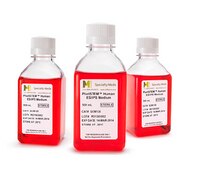Human pluripotent stem cells on artificial microenvironments: a high content perspective.
Viswanathan, P; Gaskell, T; Moens, N; Culley, OJ; Hansen, D; Gervasio, MK; Yeap, YJ; Danovi, D
Frontiers in pharmacology
5
150
2014
Show Abstract
Self-renewing stem cell populations are increasingly considered as resources for cell therapy and tools for drug discovery. Human pluripotent stem (hPS) cells in particular offer a virtually unlimited reservoir of homogeneous cells and can be differentiated toward diverse lineages. Many diseases show impairment in self-renewal or differentiation, abnormal lineage choice or other aberrant cell behavior in response to chemical or physical cues. To investigate these responses, there is a growing interest in the development of specific assays using hPS cells, artificial microenvironments and high content analysis. Several hurdles need to be overcome that can be grouped into three areas: (i) availability of robust, homogeneous, and consistent cell populations as a starting point; (ii) appropriate understanding and use of chemical and physical microenvironments; (iii) development of assays that dissect the complexity of cell populations in tissues while mirroring specific aspects of their behavior. Here we review recent progress in the culture of hPS cells and we detail the importance of the environment surrounding the cells with a focus on synthetic material and suitable high content analysis approaches. The technologies described, if properly combined, have the potential to create a paradigm shift in the way diseases are modeled and drug discovery is performed. | 25071572
 |
Doxycycline enhances survival and self-renewal of human pluripotent stem cells.
Chang, MY; Rhee, YH; Yi, SH; Lee, SJ; Kim, RK; Kim, H; Park, CH; Lee, SH
Stem cell reports
3
353-64
2014
Show Abstract
We here report that doxycycline, an antibacterial agent, exerts dramatic effects on human embryonic stem and induced pluripotent stem cells (hESC/iPSCs) survival and self-renewal. The survival-promoting effect was also manifest in cultures of neural stem cells (NSCs) derived from hESC/iPSCs. These doxycycline effects are not associated with its antibacterial action, but mediated by direct activation of a PI3K-AKT intracellular signal. These findings indicate doxycycline as a useful supplement for stem cell cultures, facilitating their growth and maintenance. | 25254347
 |
Excision of viral reprogramming cassettes by Cre protein transduction enables rapid, robust and efficient derivation of transgene-free human induced pluripotent stem cells.
Kadari, Asifiqbal, et al.
Stem Cell Res Ther, 5: 47 (2014)
2014
Show Abstract
Integrating viruses represent robust tools for cellular reprogramming, however, the presence of viral transgenes in induced pluripotent stem cells (iPSCs) is deleterious as it holds the risk of insertional mutagenesis leading to malignant transformation. Here, we combine the robustness of lentiviral reprogramming with the efficacy of Cre recombinase protein transduction to derive iPSCs devoid of transgenes. By genome-wide analysis and targeted differentiation towards the cardiomyocyte lineage, we show that transgene-free iPSCs are superior to iPSCs before Cre transduction. Our study provides a simple, rapid and robust protocol for the generation of clinical-grade iPSCs suitable for disease modeling, tissue engineering and cell replacement therapies. | 24713299
 |











